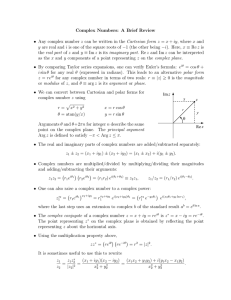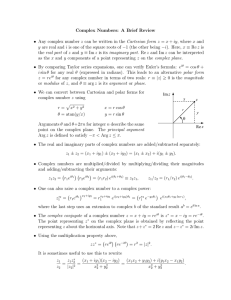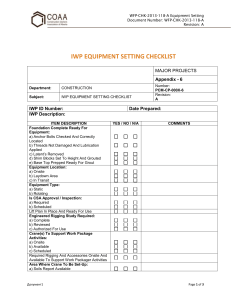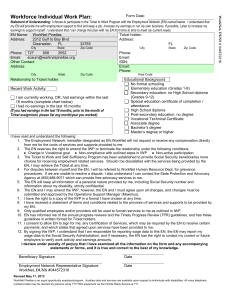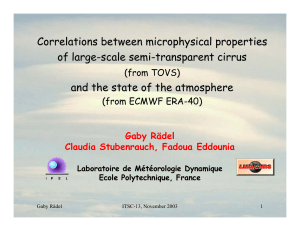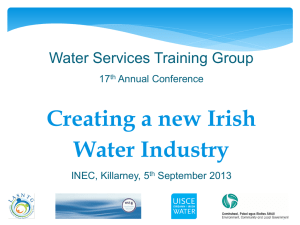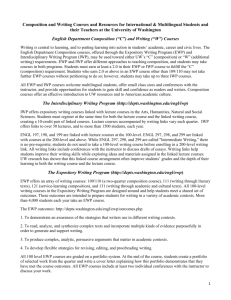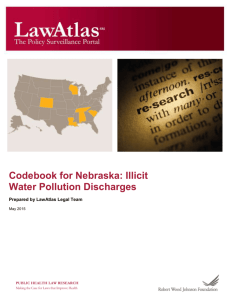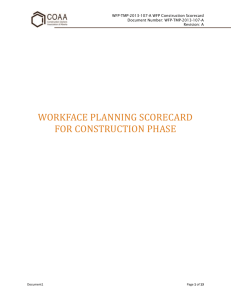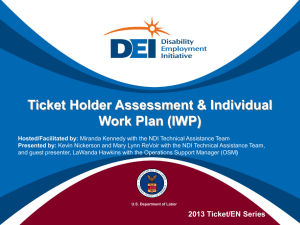Institutional Analysis
advertisement
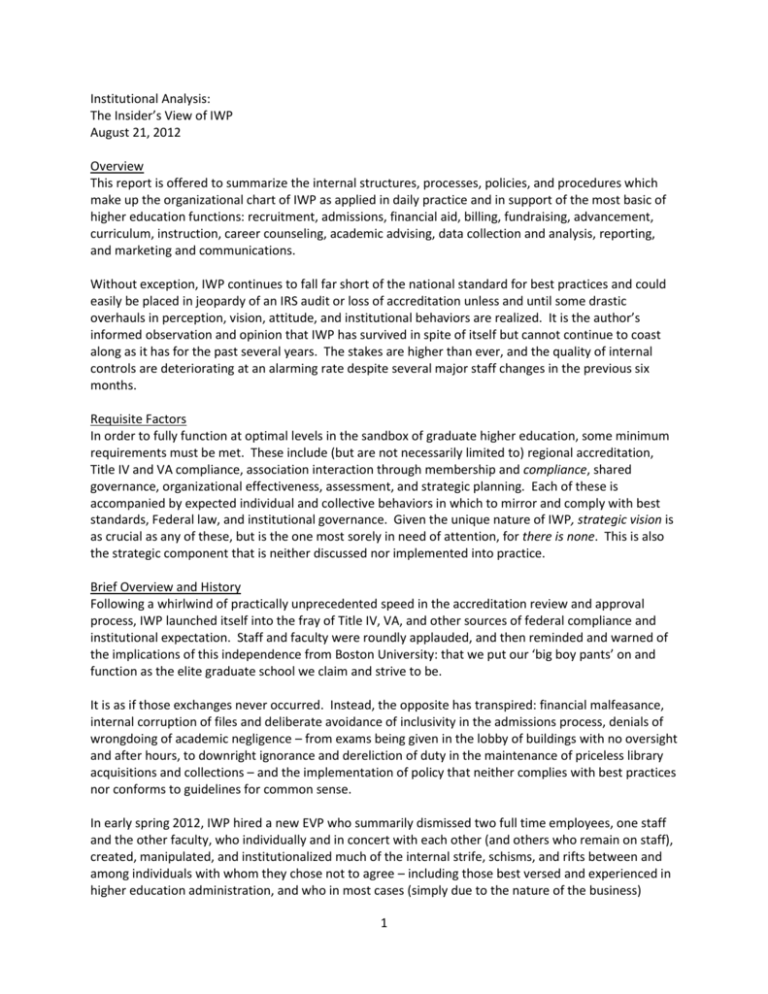
Institutional Analysis: The Insider’s View of IWP August 21, 2012 Overview This report is offered to summarize the internal structures, processes, policies, and procedures which make up the organizational chart of IWP as applied in daily practice and in support of the most basic of higher education functions: recruitment, admissions, financial aid, billing, fundraising, advancement, curriculum, instruction, career counseling, academic advising, data collection and analysis, reporting, and marketing and communications. Without exception, IWP continues to fall far short of the national standard for best practices and could easily be placed in jeopardy of an IRS audit or loss of accreditation unless and until some drastic overhauls in perception, vision, attitude, and institutional behaviors are realized. It is the author’s informed observation and opinion that IWP has survived in spite of itself but cannot continue to coast along as it has for the past several years. The stakes are higher than ever, and the quality of internal controls are deteriorating at an alarming rate despite several major staff changes in the previous six months. Requisite Factors In order to fully function at optimal levels in the sandbox of graduate higher education, some minimum requirements must be met. These include (but are not necessarily limited to) regional accreditation, Title IV and VA compliance, association interaction through membership and compliance, shared governance, organizational effectiveness, assessment, and strategic planning. Each of these is accompanied by expected individual and collective behaviors in which to mirror and comply with best standards, Federal law, and institutional governance. Given the unique nature of IWP, strategic vision is as crucial as any of these, but is the one most sorely in need of attention, for there is none. This is also the strategic component that is neither discussed nor implemented into practice. Brief Overview and History Following a whirlwind of practically unprecedented speed in the accreditation review and approval process, IWP launched itself into the fray of Title IV, VA, and other sources of federal compliance and institutional expectation. Staff and faculty were roundly applauded, and then reminded and warned of the implications of this independence from Boston University: that we put our ‘big boy pants’ on and function as the elite graduate school we claim and strive to be. It is as if those exchanges never occurred. Instead, the opposite has transpired: financial malfeasance, internal corruption of files and deliberate avoidance of inclusivity in the admissions process, denials of wrongdoing of academic negligence – from exams being given in the lobby of buildings with no oversight and after hours, to downright ignorance and dereliction of duty in the maintenance of priceless library acquisitions and collections – and the implementation of policy that neither complies with best practices nor conforms to guidelines for common sense. In early spring 2012, IWP hired a new EVP who summarily dismissed two full time employees, one staff and the other faculty, who individually and in concert with each other (and others who remain on staff), created, manipulated, and institutionalized much of the internal strife, schisms, and rifts between and among individuals with whom they chose not to agree – including those best versed and experienced in higher education administration, and who in most cases (simply due to the nature of the business) 1 happen to be female. Upon their departure, all of those who care about the mission, survival, growth, and expansion of the IWP brand into the national security arena experienced a brief period of near euphoria when they realized that previous efforts to thwart and threaten turned into new opportunities to thrive and work as a newly energized team motivated by anticipated and well planned accomplishments instead of fear – of criticism or outright termination. The New Reality IWP is poised and ready to become The Graduate School of National Security and Intelligence in the DC metro area and throughout regional, national, and international markets and spheres of influence. Its misguided tenacity in the hiring and training of staff, however, and its self-imposed insulation and isolation from understandings regarding the real world of higher education management, may become its undoing. For example, recent hires include an EVP who acts as the President in his absence, yet has no advanced degree or experience in higher education. Nor is he engaged in fundraising – which is one of the strengths on which his selection was based. In like fashion, a new full time faculty member will be assuming the vacancy created by a recent and unexpected retirement, and again, there is no advanced degree. In the best of all possible worlds in graduate higher education administration, senior staff should be required to possess a minimum of a Master’s but ALL faculty should hold an earned PhD – or an appropriately terminal degree - especially given our newfound renewal of interest in offering a doctoral degree in the not-too-distant future. Remaining staff directly involved in admissions, recruitment, student services, and other critical fields of engagement are not appropriately credentialed either with experience, training, or professional development. They are self taught, internally promoted, and trained only to know the ways of the two primary characters recently released. Instead of an intensive evaluation and audit of student files, including neglected and even discarded records, the status quo is viewed as the ongoing and acceptable norm. The Institute has also received numerous complaints about the absence of key staff during classroom hours, which often (and necessarily, and logically) extend into the early evening when students are on site and in need of individual attention and interaction. This is true of the Registrar’s Office but is critically evident with the recent hire of a new financial aid director, with 26 complaints filed to date and no removal in sight. Students choose not to see her and even if they can or do, have nothing to look forward to except belligerence and screaming conversations. She is rude and maintains a militaristic adherence to an 8:30-4:30 schedule, preferring to stay in her office with the door shut during traditional business hours. She was one of two new hires under a new EVP. The second is a very young and again, inexperienced in higher education, director of development who was hired without input from her direct report line, the VP for Advancement. It’s a formula designed for failure; most of the existing staff did not even know she was coming or that funding was available for a new position hire. There is much need elsewhere, not just in development, where a scant few development officers split their times between and among a myriad of other duties and initiatives born of poor management and the aforementioned ambivalence. In all cases, office hours are neither known nor posted, either on the website or on the office doors of those responsible and accountable. Students often climb stairs to the third floor before finding anyone ‘at home’ and available, willing and able to assist or track down individuals. There is an abiding and 2 prevailing attitude of ‘someone else will take care of it’ and/or ‘I don’t care.’ Ineptitude has been joined by and to intentional ignorance of courtesy, communication, and compliance with minimal standards of institutional behavior or even the basic courtesies of routine human interaction. Faculty Rich in practitioner experience yet unfamiliar with their roles as advisors and mentors in addition to their roles as primary instructors, most ‘full time’ faculty are neither here full time nor engaged fully in the life and times of the Institute. Very few if any are involved in any academic associations, like IAFIE s one example, preferring instead to stay home or simply take inordinate amounts of time off. Very few of them engage in academic advisement. Even fewer understand academic policies as they relate to the posting of grades and other assessment tools, or basic transfer policy as set forth by academic associations they choose to ignore. Nor are they pushed to expand their horizons, for it is not expected that they should teach more than two courses during any given term, and in some cases, should be exempt from evening duty. This just does not make sense and defies gravity of thought. In addition, 80% of the academic ‘water’ is carried by the adjuncts, who are more fully engaged in current events than their Cold War counterparts on the full time scale of compensation, and understand fully and far better what the competition is doing – and why they’re winning. IWP talks about programs in China and cyber warfare as other institutions are celebrating their first year’s worth of offerings (UMUC) while others (GMU) hire our best friends as adjunct faculty while we sit back and scratch our beards in awe and wonder at the assembly of intelligence-centric programs of the highest caliber and calling. We need expectations delineated, communicated, and reinforced through a full time dean, full time associate dean, and full time faculty chairman – all of whom are fully engaged with the routine academic activity of the Institute. Staff In direct contrast to the seasoned and sometimes elderly faculty, there is a primarily young and inexperienced staff, too many of whom come out of IWP as students and either do not finish their degrees (in some cases, they have marched in commencement) or who are hired in order to make it easier to fill vacant slots which are neither understood nor competitively searched. This is dangerous on more than one level: in addition to be incestuous, it’s male dominant and affirmative action ignorant; again, a threat to Title IV. In addition, said staff are primarily housed within a single division: admissions, recruitment, student services. Within the same division are two experienced higher education administrators, one of whom is an ineffective financial aid director hired by the new EVP with 26 complaints on file from students. This division is headed up by a VP who has been with the institute for a long period of time with no appropriate training or professional development expectations, and with minimal grasp of academic management of time, resources, or policy….and no appropriate degree. There are no regularly scheduled staff meetings, and when group discussions concerning strategy are held, faculty are not included or invited, and follow up measures are neither determined nor discussed. Library The current administration of the library and its primary (and promised) functions is an outright failure, an ongoing embarrassment, and a travesty of inexplicable proportions. Hours are not posted, and students are not afforded basic staff assistance with adequate supplies of paper for printing or even trash cans for garbage. Eating and drinking are not monitored, and staff absences are more common 3 than regular schedule maintenance, with the prevailing understanding that theft takes place on a regular basis, matched only by an attitude of ambivalence and disregard for the implications of such theft. (federal Law under and through the Clery Act mandates the reporting of campus crimes, including book theft, but it is neither monitored nor reported; this could result in loss of Title IV funding. Crime statistics are not even recorded or kept, although they have been in the past.) The general appearance of the library, on both levels of Bently Hall, is in keeping with the general appearance of Marlatt Mansion: messy, disorganized, and sloppy. Boxes of materials are stacked for months at a time and neither emptied nor moved. Trash is not discarded. Students and staff leave open containers for others to discard, even bottles of booze from time to time, in clear view. Priceless collections are not protected by staff or surveillance videos. Security is an especially critical issue, with dysfunctional cameras feeding imaginary film into locked or otherwise unoccupied staff offices. The entire space is left without any supervision, even though we are paying students to man the desks both downstairs and upstairs during summer and evening hours. Just this summer, the library went unattended for an entire week despite three hires to supplement the director in his absence while on vacation and during the summer absence (always known in advance) of the library manager. In short, it’s a joke and one that is well known to students and staff alike, yet nothing is done to correct the situation. An audit of staff time, especially vacations, and hourly timesheets would be in order, as would a full inventory of the collection in part and in whole. Worse yet, the IWP Facebook page fully reveals these deficiencies in full view for prospective students, including serious sources of professional engagement like the US Army. Most unfortunate and distressing of all is the library director’s disregard for the expressed instruction of the faculty, including the president, in the formulation of a policy for the removal/discard of individual volumes or collections. More than once in the last year, rare collections have been found carelessly tossed into the garage or alley dumpster. Nor are all faculty preferences considered when selecting books for inclusion, with numerous interventions by staff and even students to keep and inventory volumes of direct correlation with existing curricular requirements in geography, economics, history, and the like. Last but not least, the library director maintains his personal collection of theological books on 75 shelves’ worth of space on the lower level of the library while other books seek new homes. At the same time, we’re throwing away relevant books of unmeasurable worth, many of which were donated and known to the faculty as being necessary elements of the instructional and research mission of the school. All of this has been reported to the administration. Bare bone basics On a more tactical level and within any given semester or term, there continues to be voids in: HR policy (including the determination and monitoring of leave) IT policy (what is appropriate; standard signature blocks for use by all) Strategic planning (there is no active plan currently in effect) Timesheets (hourly employees fill them out; full time staff don’t) Adequate or appropriate notice for events involving staff (new student orientation; open houses) Operations management (currently split between receptionist and development officer) Federal law compliance (Clery act; campus crime; training of faculty in ethics) 4 Campus security (no ID cards for staff or faculty; unchanged entrance codes to buildings; knowledge of who lives on third floor of Bently Hall) Competitive or collaborative hiring practices Strategic and collaborative recruitment policy and practice, especially with regard to the outreach to professional student sources and colleges with ROTC programs, not just small Catholic schools Staff training (reliance on untrained interns on phones each term) Regard for and understanding of compliance standards through academic association interactions (NACUBO, AACRAO, ACE, CASE, IAFIE, NGB, CGS, NASFA) Shared governance practice Data dissemination: FTE, student body size and composition; demographics; admissions statistics Mandatory training programs/professional development for all staff, including interns Public postings of strategic planning, accreditation activity Board review policies and practice Adequate website support (intranet, redesign, online capability) Academic advising Staff assessments, including 360 peer reviews Sustained advertising and marketing Dedicated alumni affairs function (newly folded into director of development’s portfolio) Career consulting by other than a contractual hire with competing constituents Posting and adherence to office hours which are convenient for students Reliance on other staff for completion of duties and responsibilities (especially in library) Heaps of trashed furniture in the garage, including the occasional dead rodent Work ethic Accountability Communication Collaboration Courtesy Summary Academic institutions are living organisms – they grow, they create, they nourish, they teach. IWP is a truly unique ‘toddler’ in the vast history of higher education in the US, and represents a brave experiment, not unlike the Nation it serves in mission. In practice, however, much needs to happen in a relatively short time if the toddler is to achieve adulthood. Recent extractions of staff are akin to the removal of a cancer – but there are residual elements in need of vast doses of chemo in order to completely remove the effects of the ‘disease.’ The good news: it’s all fixable. The remedy: leadership that mandates a new work ethic and one which mirrors the mission of the school itself. IWP is stuck in a swamp of adolescent behaviors that have no place in a mature institution with a serious mandate. Glimmers of hope have been recently introduced, but they are already dimmed by the inactivity and contentment with status quo which were NOT expected to remain. Attached is a sample of a strategic vision which follows one of several paths to institutional achievement and effectiveness. The author recommends that a similar approach might be worth consideration. 5 6
